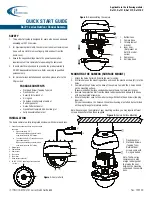
22
|
Using the Manual Flash Mode
Using the Manual Flash Mode
You can also set the VS-510C’s flash output level manually, for greater creative control over your images. Six
manual settings are available: 1/1, 1/2, 1/4, 1/8, 1/16, and 1/32. The 1/1 setting is the full-power flash, and
each successive setting halves the light output. To use the manual mode, turn the flash and camera on and
follow these steps:
1. Press the Mode button repeatedly to cycle through the flash modes until “M” and the flash output level
indicator show on the LCD. Continue to press the Mode button to select the desired flash output level.
2. Set the exposure settings you want to use on your camera. The highest shutter speed available will be
your camera’s flash sync speed. To use higher shutter speeds, switch to automatic TTL mode and activate
high-speed sync (see
Using High-Speed Sync
on page 19).
3. Make sure that your subject is not farther away than the suggested maximum flash-to-subject distance
indicated on the flash LCD and take a test shot. Check the exposure on your camera’s LCD.
4. Adjust your camera’s exposure settings and the light output level of the flash as needed.
5. Press your camera’s shutter-release button to take the picture.
















































